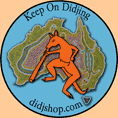| Proposal to legislate for compulsory labelling of Aboriginal arts and crafts |
|
We are an exporter of Aboriginal arts and artefacts since over twelve years specialising in didgeridoos. Our business is not owned by Aboriginal people but we source all of our Aboriginal products only from Aboriginal suppliers. Out of our experience in the industry we are very concerned that Aborigines receive less and less benefits from this industry which is based on their culture. While in the beginning of the Aboriginal art industry over ten years ago Aborigines received substantial benefits from this industry. Such benefits have almost completely dried up by now. This is leading to increased disenchantment of Aboriginal people, growing hate against non-Aboriginal people exploiting their culture and increased substance abuse by Aboriginals. We also observe a very high degree of customer deception in the industry. Most tourist to Australia believe they are buying Aboriginal made souvenirs when almost all those souvenirs are imported or made by non-indigenous people. We are convinced that once Aboriginal arts and crafts will be required to be labelled as suggested below, employment of Australian Aborigines will grow substantially, a very important and real step towards reconciliation will be made and tourists will no longer be deceived into buying Aboriginal arts and crafts which are not made or decorated by Aborigines. The present problems with Aboriginal arts and crafts Presently, due to the lack of any existing labelling legislation, the vast majority of 'Aboriginal' arts and artefacts currently sold in and out of Australia are not made, designed or painted by Aborigines. They are however still sold as 'Aboriginal art' - a mostly deliberate deception of customers. We are aware of several examples: A large internationally renown business in Cairns employs Aborigines as sales staff in its retail store. Almost all didgeridoos sold there are harvested and manufactured by non-indigenous persons and some of those didgeridoos are painted by non-indigenous people. Neither of these facts are pointed out to customers who are left to believe that they are buying genuine Aboriginal made artefacts - specially since they are sold by Aboriginal sales staff. We have heard that another shop in Shield street in Cairns actually sends hollow eucalyptus logs - harvested by non-indigenous people - to Indonesia where they are fashioned into didgeridoos, decorated with intricate 'Aboriginal' art and then re-imported to Australia and sold to tourists as 'Aboriginal' art. We receive offers from Indonesian and Indian didgeridoo manufacturers to import 4 1/2' wooden didgeridoos fully painted with 'Aboriginal' art for about A$10.- to 20.- per piece. This is about one tenth of the price we pay to Aboriginal people for the same product. We obviously do not follow up on such offers, but many of our competitors are. Those cheap imports are sold for slightly less than Australian made didgeridoos providing those retailers with huge profits. We estimate there to be over 100 retailers in the Cairns/Kuranda area selling didgeridoos. To our knowledge there are only 4-5 of these selling only Aboriginal made didgeridoos, all of them being very small businesses unable to effectively compete with the cheap imports and non-indigenous products sold by everyone else. And not a single one of the others points out to their customers if a particular product is not made by Aborigines. There is a still growing market of 'Aboriginal' souvenirs imported into Australia. None of this stuff has ever been touched by an Aboriginal person and for well over 90% of these goods no royalty for the Aboriginal designs used is paid to Aboriginal people. The sale of products not made by Aboriginal people itself would not be a problem if the businesses which sell those cheap imports would be honest and tell their customers that the product is not made by an Aboriginal person. Because of the deception which is allowed to continue due to a lack of legislation the situation is getting progressively worse and Australian Aboriginal people are pushed out of the industry. We estimate that ten years ago about 60% of didgeridoos were made by Aboriginal people and about 80% were painted by them. Today less than 10% of didgeridoos are made by Aboriginals and less than 40% are painted by them. Please note these figures are excluding bamboo didgeridoos. Bamboo didgeridoos are almost all imported. The Proposed Solution We want to ask the Australian Government to commit itself to introduce legislation requiring compulsory labelling for all Aboriginal arts, artefacts and crafts to the following effect: Products which shall be covered by the legislation:
Any and all such products shall carry a label listing the following:
IF THE PRODUCT HAS ANY ABORIGINAL DESIGN NOT APPLIED BY ABORIGINAL PEOPLE:
We suggest you make one exception: An Australian Aborigine selling his/her own art or artefact can but does not have to label his/her product. Otherwise there is a possibility of this legislation working against some Aborigines who are not aware of it or cannot write a label. It is very imported that the legislation is worded so that any item considered to be Aboriginal art, artefact or crafts which is not made, painted or designed by an Aboriginal person is clearly labelled to show whether money from the purchase of the item goes to Aboriginal people. It is more important to have products not made by Aborigines labelled correctly than products which are. The legislation has to provide adequate punishment for anyone failing to adhere to it. Benefits of this legislation:
Please note that we strongly believe that any system which attempts to label Aboriginal made Art as such without requiring to label Aboriginal looking art made by non-Aboriginal people is bound to fail. Svargo Freitag
|
|
Home | About Us | Checkout | Community | Help | Information | Shopping Didj Forum | Send a Didj Greeting Card | Guest Book |
| © Didjshop.com, 1993-. For rights reserved and granted see our Copyright notice. |
